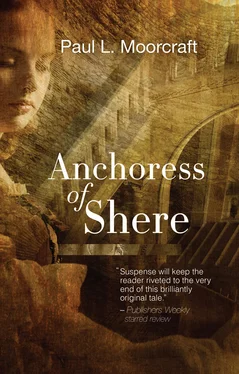Paul Moorcraft - The Anchoress of Shere
Здесь есть возможность читать онлайн «Paul Moorcraft - The Anchoress of Shere» весь текст электронной книги совершенно бесплатно (целиком полную версию без сокращений). В некоторых случаях можно слушать аудио, скачать через торрент в формате fb2 и присутствует краткое содержание. Жанр: Триллер, на английском языке. Описание произведения, (предисловие) а так же отзывы посетителей доступны на портале библиотеки ЛибКат.
- Название:The Anchoress of Shere
- Автор:
- Жанр:
- Год:неизвестен
- ISBN:нет данных
- Рейтинг книги:4 / 5. Голосов: 1
-
Избранное:Добавить в избранное
- Отзывы:
-
Ваша оценка:
- 80
- 1
- 2
- 3
- 4
- 5
The Anchoress of Shere: краткое содержание, описание и аннотация
Предлагаем к чтению аннотацию, описание, краткое содержание или предисловие (зависит от того, что написал сам автор книги «The Anchoress of Shere»). Если вы не нашли необходимую информацию о книге — напишите в комментариях, мы постараемся отыскать её.
The Anchoress of Shere — читать онлайн бесплатно полную книгу (весь текст) целиком
Ниже представлен текст книги, разбитый по страницам. Система сохранения места последней прочитанной страницы, позволяет с удобством читать онлайн бесплатно книгу «The Anchoress of Shere», без необходимости каждый раз заново искать на чём Вы остановились. Поставьте закладку, и сможете в любой момент перейти на страницу, на которой закончили чтение.
Интервал:
Закладка:
“He used the black gargoyles with gaping mouths that before were heads as hearth-stones for the roasting of our meat. I felt I could not eat, but we had ridden long and hard, and hunger was on us, despite our battle and the smell of flesh. We feasted on the fireplace of the Saracens.”
The squire was always content with the utter silence that would fall on the tavern, no matter that it was the twentieth telling of his tale.
***
Michael Duval was also content with the power of his sadistic invention, or “selective reinterpretation” as he would term it. He would now work this episode into his story of Christine.
The historical evidence for Christine’s story was meagre: essentially three letters, written in Church Latin between 1329 and 1332. Duval had researched related histories of the lives of anchorites and anchoresses as well as local records. But nothing had told him why the most well-formed girl in the valley-the priest was fusing spiritual and earthly splendour-had chosen a life of total enclosure in a cell in the wall of St. James’s church in the hamlet of Shere. Nevertheless, her story had seized his imagination and fired his intellectual curiosity, finally consuming him as though it were a literary transubstantiation: he could feel Christine’s flesh and blood coming alive through him. If evil was caused by the flesh, he asked himself, how could the Devil be explained, the fallen angel who had no flesh? Better to explain evil as integral to man’s nature, but goodness, yes, that could be generated by flesh, especially flesh as perfect as mortality would allow. A young girl’s flesh. The life of Christine was not so much a history as his own creation, a rebirth of his faith, perhaps even the Eucharist of his soul; he had become a consecrated writer. When he picked up his pen to make notes before he typed, he imagined the blood flowing down through his hands into the pen and on to the pure white paper.
August 1327
Edward II had taken up the Cross fourteen years before, and for a century to come the kings of England were to be absorbed in squabbles abroad, for God in the Holy Land and for Mammon in France. When Christine was born in Shere in the year of our Lord 1311, her village had been racked by famine. Harvests failed and murrain infected the oxen and sheep. Plague, taxes and revolt were to lay waste an England often deserted by her lords, her kings and perhaps even by God.
Very near St. James’s, her parish church, Christine dwelled in Ashe Cottage, a house with three large crucks-curved tree trunks-forming a series of arches, with a ridge pole to hold the steep thatched roof. The walls were wattle and daub, strengthened with a solid wooden frame. William the Carpenter had built a screen to divide the cottage into a small open room and a bower, or bedroom. In the main room stood an open fire for cooking and heat, with a space in the roof to let out the smoke. In addition, the cottage boasted four windows with skilfully fashioned wooden shutters. William had also built a small lean-to for his two cows and his goat because, very unusually, he did not hold with animals sharing the house, as was the custom among the English peasantry. His well-crafted cottage was home to his wife, Helene, and his three children: Christine, Margaret, younger by two years, and the last-born, a son also called William.
William the elder, although bonded to the FitzGeoffrey family, also worked as a journeyman carpenter, employing an apprentice of nineteen, a runaway serf who had been caught and branded on the forehead, but who had reformed his character under the stern, albeit fair, tutelage of the craftsman. Recently, William’s status in the village had been secured by his election as the headman of his tithing group. Except at harvest time, he paid his obligation in kind or coin. His garden provided some staple vegetables, but his defence against starvation was his mastery of wood. Despite the years of anguish and hunger in the village William had survived, even prospered, and so his salt box was always full. Through the dexterity of his hands he provided whey, cheese, buttermilk, peas and beans, daily bread of mixed barley and oats, and-on high days-wheaten bread, washed down with spicy nut-brown ale. He could even treat his family to salted beef or smoked bacon, too, on many a Sunday.
William sat contemplating his lot in this August of 1327. This year the harvest had been fruitful and he had completed his boon work for his lord and paid his tithes. The reeve had collected all, even the wood-silver for coppicing the lord’s timber for his carpentry and for his fire. There was, however, one small debt to be paid: the merchet due to Sir Richard. His Christine was to be betrothed to Simon, the tailor’s son. The priest had agreed and all that remained was for William to ask his lord for permission. It was the old tradition, although William knew that in the towns such niceties were being forgotten. It was a relatively small fee, normally six pence, an equivalent in groats or marks, or a gift in kind. So William had fashioned a chair fit for the lord, who, by the reeve’s intercession, had made it known that such a gift was acceptable.
That particular balmy evening, William sat outside his cottage on a bench, dressed in his best breeches, his serge tunic tucked into a belted waist. And next to him stood the magnificent carved chair, which he stroked almost absent-mindedly. His reverie was partly induced by the jug of ale which had been brought to him by Helene, who smiled indulgently at her husband as he, in turn, looked with love on the face that displayed loyalty in every weathered crease. Sipping at the ale, he pincered a hair-louse between his thumb and the broken nail on his forefinger. He looked up as he flicked the parasite away, and locked his gaze on the in-field, the last to be harvested. The barley and oats had been scythed, the strips of wheat had been sickled, and the binders had gathered the corn into sheaves to stack them into shocks to dry. A few of the old people and younger villagers were gleaning the fields to save the last handfuls of the harvest, while the paupers were foraging in the hedges and end strips. Soon the cattle would be set free amidst the stubble.
The sun nestled in the wooded hills that cloaked the pass to Guldenford as the warm ale settled comfortably in William’s stomach. The carpenter was his own man, devout, yet possessed of a fine sense of justice, usually tempered by humour. He was unlettered, it was true, but he had memorised many of the chapters from the Gospel by sheer diligence and attendance at the church of St. James three times each Sunday.
As the trees in the Hurtwood began to turn pink in the scented sunset, he saw Christine walking from the in-field where she had been helping to glean the corn. William noticed that Simon, her betrothed, kept his distance from her, but the young man’s eyes followed Christine as the small group of villagers filed out of the main field.
William thought that her blond hair outdid the glory of even the richest cornfield. She was tall for a village girl and her limbs so perfectly proportioned that even a father could decently note her fair looks. He loved his first-born and had planned her marriage into a respectable tailoring family with considerable care, and not without a little consultation with his wife and Christine, although, ultimately, he was a man who heeded his own counsel.
As she entered their gate, William beamed a toothless grin at her and said, “See, Christine, I have finished your chair. All be agreed with the reeve. This gift be better than a handful of groats-not that I couldn’t be payin’ in coin, what with the good harvest an’ all.”
Christine kneeled by the chair and touched it as though it were a sacred relic. “I thank you, father,” she said, “for all the work. This chair be fittin’-aye, more than fittin’-for a lord.”
Читать дальшеИнтервал:
Закладка:
Похожие книги на «The Anchoress of Shere»
Представляем Вашему вниманию похожие книги на «The Anchoress of Shere» списком для выбора. Мы отобрали схожую по названию и смыслу литературу в надежде предоставить читателям больше вариантов отыскать новые, интересные, ещё непрочитанные произведения.
Обсуждение, отзывы о книге «The Anchoress of Shere» и просто собственные мнения читателей. Оставьте ваши комментарии, напишите, что Вы думаете о произведении, его смысле или главных героях. Укажите что конкретно понравилось, а что нет, и почему Вы так считаете.












